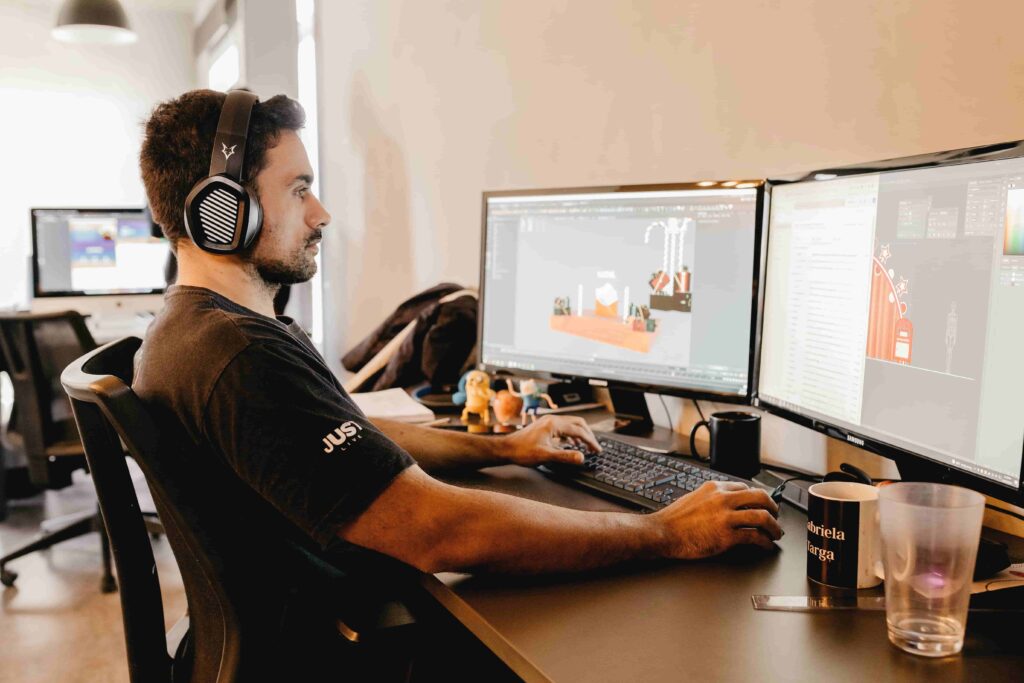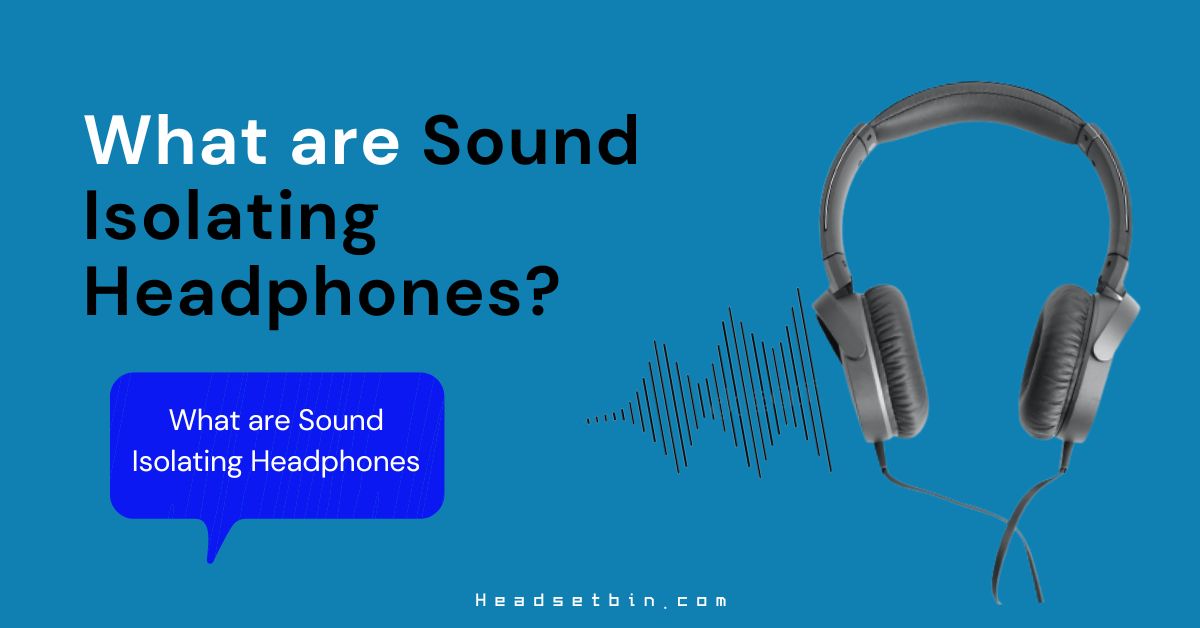Listening to music or doing any work while wearing headsets, people want to listen to every crisp of the music without missing any one of them. If you also want to enjoy your music completely and purposely then you should consider buying headphones that offer sound isolation. But What are Sound Isolating Headphones?
Noise isolation is a passive process. There is no technology embedded in achieving sound isolation headphones. The physical structure of these headphones does not let the sound transfer from one system to another. Their structure packs your ear in a way that you can only hear the sweet music pumped through your laptop or smartphone.
How do Sound Isolating Headphones Work?
Sound-isolating headphones work normally as other headphones do. They are just designed in a way that will go deeper into your ear canal. The ear canal is properly covered by the silicon or foam tips of these headphones which makes a person feel like his ears have been completely packed and no voice will go outside. You will have a chance to hear every crisp of your music by passively blocking all the outside voices.
Here, the word ‘’passively blocking’’ genuinely means that noise isolation can be achieved without using extra power because there are no electronics involved in sound isolation and there will be no need for extra batteries. Their physical structure is enough to let you experience your music properly.
Do Sound Isolating Headphones Block Out Voices?
Working in a noisy office? This can be a great obstacle to your work. Noise-isolating headphones although designed to not let the sound transfer. But this feature only helps if they are busy providing you with sound. Wearing isolating headphones without music in a noisy environment may help reduce the voices but you can’t expect complete silence from the surrounding.
Concluded that noise-isolating headphones are unable to block high-pitched voices if they are not playing any sound. If they are plugged into any device and busy providing you sound, blocking of voices is possible to an extent. Otherwise, voice reduction is possible but blocking high-pitched voices (like talking) cannot be achieved by them.
By the way, if you are washing your car at home, you can also use these noise-isolating headphones to avoid the pressure noise of the water.
Different Types of Sound Isolating Headphones?
You don’t want to hear the voices like the buzzes of engines, the snorting voices of the airplane, and the annoying voice of the crying baby indulging in your music. Concerning this, 3 types of sound isolation headsets can offer voice blockage.
- Passive noise-cancellation headphones
- Active noise isolation headphones or noise cancellation headphones
- Adaptive headphones
Passive noise Isolation/cancellation headphones:
Passive noise cancellation headphones or often called noise isolation headphones are the most simple and cheapest type of headsets. They have no technology to block the voices. They have a bulky and thick structure that isolates the sound of your music from your ear. In this way, you can hear every little crisp of your music. They don’t need any electronic technology which means there will be no extra power ingesting. Your ear canals are completely packed by the foamy tips of these headphones.
However, wearing them for a long time can cause you an ear sore as they are deeply inserted in your ear canal. Because of its bulky and inserted structure, you have to feel distortions every time the cable moves. Having a perfect size that can fit properly in your ear is necessary if you are considering them.
Active noise isolation or noise cancellation headphones:
Active noise isolation or noise cancellation headphones (ANC) are the advanced type of noise isolation headphones. They have a small audio-built technology that helps eliminated outside voices more efficiently. ANC doesn’t have a bulky and foamy structure. They are stylish in appearance. Although, you need extra power consumption to achieve noise isolation. They are pricey as compared to noise isolation headphones but can offer a strong blockage than them.
Even you can use them for a long time because they are extremely comfortable. Although, less battery timing and burdensome weight can be counted as its disadvantages. You need more power to achieve noise isolation using electronics, which offer less battery timing than noise-isolation headphones. But the sound quality provided by these headphones is amazing and cannot be matched by sound isolation headphones.
Adaptive headphones:
As the name shows, these headphones tend to work like sound isolation and noise cancellation headphones according to your needs and preference. You can adjust them. If listening in a quiet environment and don’t want noise isolation, turn off ANC via the companion app. Wearing them in a hustle environment and can’t compromise on quality, turn on ANC or adjust the ANC level according to your choice. They are the most demanding and eye-catching to buyers.
Some headphones also come with adaptive technology which automatically adjusts the noise cancellation level according to the surroundings. Comfortable to wear, stylish in appearance, and provides the utmost technology of adjusting to your need making them attention-grabbing. However, battery consumption and weight are their drawbacks.
Pros of Using Sound Isolating Headphones:

Good quality sound:
Sound isolation headphones are noticeable for their sound quality. They provide a very loud and crispy voice. They surround your ears in which sound is an isolate, letting you hear every small-pitched sound as well.
Keep your concentrate:
As they don’t let the outside voices make their way into your music. Therefore, if you had to work in a noisy office, sound isolation headphone is a perfect choice for you. They help you to concentrate on your work while making you away from nosy gossip. That’s the reason why musicians wear noise-canceling headphones.
Low energy consumption:
Noise-isolating headphones use passive methods to isolate sound. Therefore, there is no extra energy consumption. This makes their battery timing extended.
Light weighted:
Unlike noise cancellation headphones which have an audio-built system, sound isolation doesn’t passively bloke the voices making them light weighted and easy to carry as compared to noise cancellation headphones.
Budget-friendly:
After providing all these benefits, noise isolation headsets are also cheap. They are less pricey than ANC and adaptive headphones.
Cons of Using Sound Isolating Headphones:
Uncomfortable:
Noise isolation headsets are not a comfortable option to wear for a long time. they are designed to insert deeply in ear canals. They have silicon of foam tips that fit perfectly in the ear canal, leaving a sore in your ear.
Distortions:
Little carelessness in choosing the perfect tip size while buying can bring you many discomforts. If the ear-tip is too tight with your ear, it will not only be uncomfortable for you. But also give you a distorted voice whenever the cable makes a move.
FAQs:
1. What do noise-isolating headphones do?
Noise-isolating headphones block the outside voice. Or more specifically, they isolate the sound to your ear passively (without using any technology). Complete sound isolation is achieved through their unique structure. They have silicon tips that do deeper into your ear canal.
2. What’s the difference between sound isolating and noise Cancelling?
Sound isolating and noise canceling may seem identical but they are entirely different terms. Noise cancellation blocks outside noises actively (by energy consumption). While sound isolating headphones isolate sound passively (without energy consumption). They achieve sound isolation through their unique structure.
3. Which is better noise canceling or noise isolation?
They both have their pros and cons. But most people still favor noise-cancellation headphones. Although they are costly but are comfortable to wear even for a long time and can provide better sound quality.
4. Is sound isolation noise canceling?
No, they are not the same. Sound isolation means eliminating the transfer of sound from one system to another. Noise cancellation means blocking the outside voices through small-audio build technology.
5. Are there headphones that block all background noise?
Noise-cancellation headphones have the ability to block all background noises. They help you to eliminate the annoying surrounding noises and can help you experience the extra crispiness of your music. There are many best picks but the most popular ones are Air pods Pro and Sony WH-1000XM4.
Conclusion:
Noise isolation is designed mainly for people who don’t want to compromise on sound quality. They feel like heaven for people who have to face noisy situations. They can keep the sound isolated to your ears passively.
As there is no technology involved to achieve sound cancellation, they consume less power and offer long battery life. They are lightly weighted, easy to carry, budget-friendly, and offer good-quality sound. However, they may not satisfy you when it comes to comfort.

